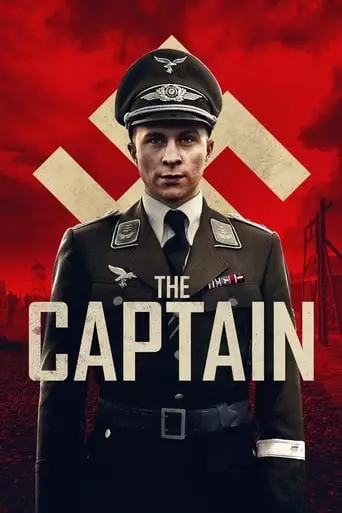
The Captain (2017) Watch Online Free
Germany, 1945. Soldier Willi Herold, a deserter of the German army, stumbles into a uniform of Nazi captain abandoned during the last and desperate weeks of the Third Reich. Newly emboldened by the allure of a suit that he has stolen only to stay warm, Willi discovers that many Germans will follow the leader, whoever he is.
The Captain is a 2018 German film directed by Robert Schwentke, set during the final days of World War II in April 1945. The narrative follows Willi Herold, a 19-year-old German soldier who, after deserting his unit, stumbles upon an abandoned officer’s uniform. Donning the uniform, he assumes the identity of a captain, gaining authority and commanding respect from fellow soldiers and civilians. Emboldened by his newfound power, Willi leads a group of deserters and misfits, engaging in acts of violence and cruelty, including the execution of prisoners. The film explores themes of power, identity, and the human capacity for evil under the influence of authority.
The Captain delves into how individuals can be corrupted when granted unchecked power. Willi’s transformation from a frightened deserter to a ruthless leader illustrates the ease with which power can corrupt, especially when one is unprepared for its weight. His descent into tyranny highlights the dangers of absolute authority and the moral decay it can engender.
The film examines the fluidity of identity and the lengths to which individuals will go to deceive others—and themselves. Willi’s adoption of a false identity allows him to manipulate those around him, raising questions about the nature of self and the masks people wear to navigate societal structures.
Through its portrayal of Willi’s actions and the compliance of those around him, The Captain reflects on the concept of the banality of evil. It suggests that ordinary individuals, when placed in certain circumstances and given authority, can commit atrocities without deep reflection or remorse.
The film presents war as a chaotic and absurd environment where traditional moral codes are upended. Willi’s rise to power and the subsequent events underscore the senselessness of conflict and the human propensity to engage in violence under the guise of duty or survival.
The Captain has been recognized for its unflinching portrayal of the darker aspects of human nature during wartime. Critics have praised its stark black-and-white cinematography and the compelling performance of Max Hubacher as Willi Herold. The film has sparked discussions about the psychological effects of power and the moral complexities faced by individuals in extreme situations. Its critical acclaim includes positive reviews from publications such as Roger Ebert’s website, which commended the film’s direction and thematic depth.
The Captain offers a raw and unvarnished look at how power can corrupt individuals, making it a compelling study of human nature under duress. The film’s portrayal of Willi’s transformation from a frightened soldier to a tyrannical leader serves as a chilling reminder of the potential for evil within us all.
The film’s black-and-white cinematography, reminiscent of classic war films, enhances its grim atmosphere and underscores the bleakness of the narrative. The visual style effectively conveys the desolation of the war-torn landscape and the moral decay of the characters.
Max Hubacher delivers a standout performance as Willi Herold, capturing the character’s internal conflict and descent into madness with nuance and intensity. His portrayal adds depth to the film, making Willi’s transformation both believable and haunting.
The film tackles complex themes such as identity, the corrupting influence of power, and the banality of evil, prompting viewers to reflect on the nature of humanity and the moral compromises individuals make in extreme circumstances.
The Captain presents a tense and suspenseful narrative that keeps viewers engaged from start to finish. The unfolding events are unpredictable, with each scene escalating the tension and moral dilemmas faced by the characters.
Set during the final days of World War II, the film provides a unique perspective on the chaos and moral ambiguity of the era. It offers insight into the psychological impact of war on individuals and the breakdown of societal norms.
The Captain has received positive reviews from critics, including Roger Ebert’s website, which praised its direction and thematic depth. Its critical acclaim underscores its significance as a thought-provoking and artistically accomplished film.
After watching The Captain, viewers are likely to experience a profound sense of unease and introspection. The film’s unvarnished portrayal of human cruelty and the corrupting influence of power can be both disturbing and thought-provoking. The stark black-and-white imagery and the haunting performance by Max Hubacher leave a lasting impression, prompting reflection on the darker aspects of human nature and the moral complexities of war. The film’s open-ended conclusion may also evoke a sense of ambiguity, encouraging viewers to contemplate the fates of the characters and the broader implications of the narrative.
In conclusion, The Captain is a harrowing and thought-provoking film that delves into the depths of human nature during the chaos of war. Its compelling narrative, exceptional performances, and exploration of complex themes make it a significant contribution to war cinema. While it may be unsettling, it offers valuable insights into the human condition and the moral challenges faced in extreme circumstances.
